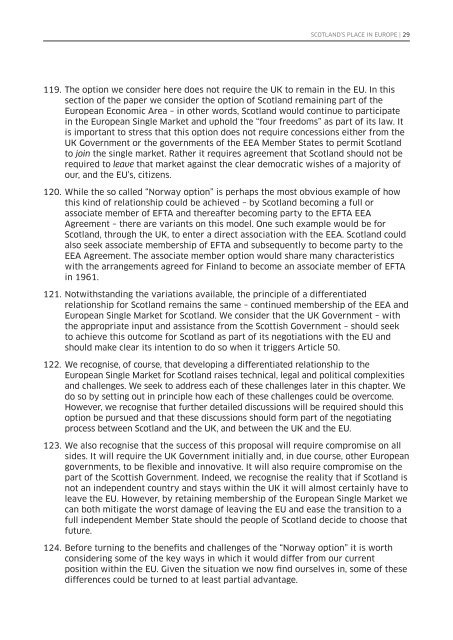Scotland’s Place in Europe
5tSyKxiOE
5tSyKxiOE
Create successful ePaper yourself
Turn your PDF publications into a flip-book with our unique Google optimized e-Paper software.
SCOTLAND’S PLACE IN EUROPE | 29<br />
119. The option we consider here does not require the UK to rema<strong>in</strong> <strong>in</strong> the EU. In this<br />
section of the paper we consider the option of Scotland rema<strong>in</strong><strong>in</strong>g part of the<br />
<strong>Europe</strong>an Economic Area – <strong>in</strong> other words, Scotland would cont<strong>in</strong>ue to participate<br />
<strong>in</strong> the <strong>Europe</strong>an S<strong>in</strong>gle Market and uphold the “four freedoms” as part of its law. It<br />
is important to stress that this option does not require concessions either from the<br />
UK Government or the governments of the EEA Member States to permit Scotland<br />
to jo<strong>in</strong> the s<strong>in</strong>gle market. Rather it requires agreement that Scotland should not be<br />
required to leave that market aga<strong>in</strong>st the clear democratic wishes of a majority of<br />
our, and the EU’s, citizens.<br />
120. While the so called “Norway option” is perhaps the most obvious example of how<br />
this k<strong>in</strong>d of relationship could be achieved – by Scotland becom<strong>in</strong>g a full or<br />
associate member of EFTA and thereafter becom<strong>in</strong>g party to the EFTA EEA<br />
Agreement – there are variants on this model. One such example would be for<br />
Scotland, through the UK, to enter a direct association with the EEA. Scotland could<br />
also seek associate membership of EFTA and subsequently to become party to the<br />
EEA Agreement. The associate member option would share many characteristics<br />
with the arrangements agreed for F<strong>in</strong>land to become an associate member of EFTA<br />
<strong>in</strong> 1961.<br />
121. Notwithstand<strong>in</strong>g the variations available, the pr<strong>in</strong>ciple of a differentiated<br />
relationship for Scotland rema<strong>in</strong>s the same – cont<strong>in</strong>ued membership of the EEA and<br />
<strong>Europe</strong>an S<strong>in</strong>gle Market for Scotland. We consider that the UK Government – with<br />
the appropriate <strong>in</strong>put and assistance from the Scottish Government – should seek<br />
to achieve this outcome for Scotland as part of its negotiations with the EU and<br />
should make clear its <strong>in</strong>tention to do so when it triggers Article 50.<br />
122. We recognise, of course, that develop<strong>in</strong>g a differentiated relationship to the<br />
<strong>Europe</strong>an S<strong>in</strong>gle Market for Scotland raises technical, legal and political complexities<br />
and challenges. We seek to address each of these challenges later <strong>in</strong> this chapter. We<br />
do so by sett<strong>in</strong>g out <strong>in</strong> pr<strong>in</strong>ciple how each of these challenges could be overcome.<br />
However, we recognise that further detailed discussions will be required should this<br />
option be pursued and that these discussions should form part of the negotiat<strong>in</strong>g<br />
process between Scotland and the UK, and between the UK and the EU.<br />
123. We also recognise that the success of this proposal will require compromise on all<br />
sides. It will require the UK Government <strong>in</strong>itially and, <strong>in</strong> due course, other <strong>Europe</strong>an<br />
governments, to be flexible and <strong>in</strong>novative. It will also require compromise on the<br />
part of the Scottish Government. Indeed, we recognise the reality that if Scotland is<br />
not an <strong>in</strong>dependent country and stays with<strong>in</strong> the UK it will almost certa<strong>in</strong>ly have to<br />
leave the EU. However, by reta<strong>in</strong><strong>in</strong>g membership of the <strong>Europe</strong>an S<strong>in</strong>gle Market we<br />
can both mitigate the worst damage of leav<strong>in</strong>g the EU and ease the transition to a<br />
full <strong>in</strong>dependent Member State should the people of Scotland decide to choose that<br />
future.<br />
124. Before turn<strong>in</strong>g to the benefits and challenges of the “Norway option” it is worth<br />
consider<strong>in</strong>g some of the key ways <strong>in</strong> which it would differ from our current<br />
position with<strong>in</strong> the EU. Given the situation we now f<strong>in</strong>d ourselves <strong>in</strong>, some of these<br />
differences could be turned to at least partial advantage.


